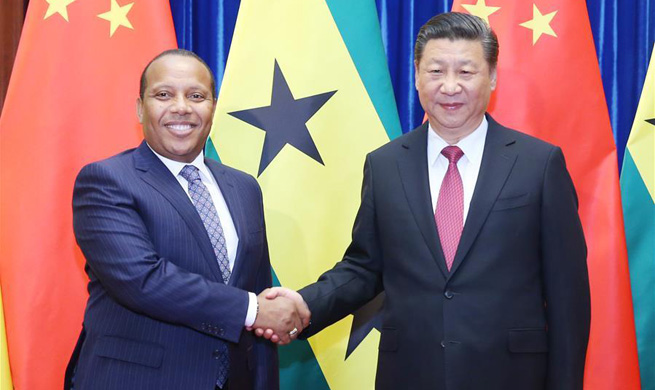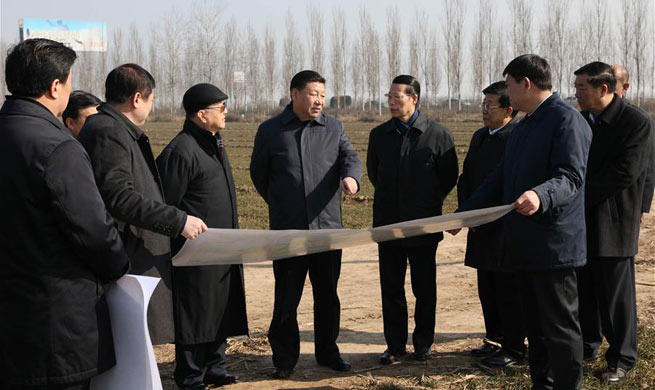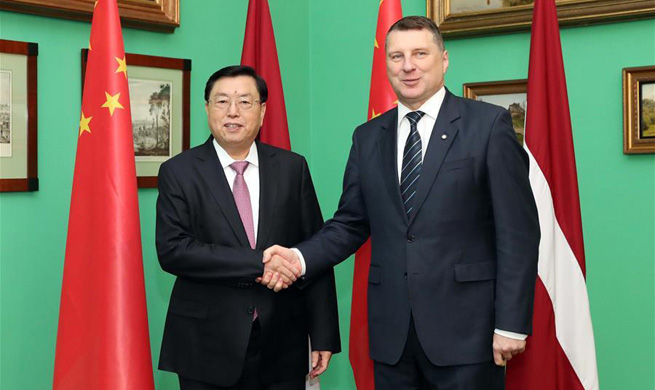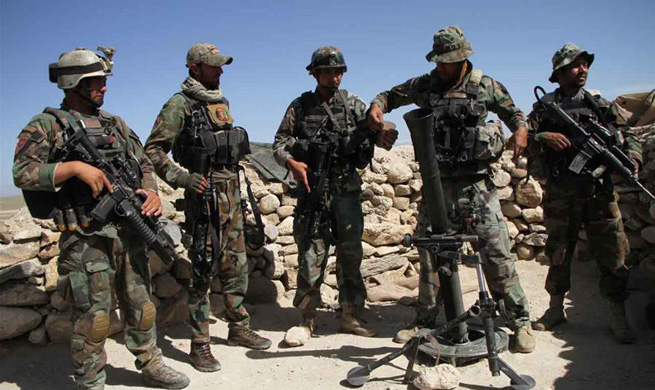ISTANBUL, April 14 (Xinhua) -- As Turks go to the polls on Sunday over whether to accept amendments to the constitution to make way for a presidential system, "No" campaigners feel confident about their victory, though many polls indicate a neck-and-neck race.
According to polls made public in the past week, both "Yes" and "No" camps may emerge victorious by a small margin by garnering 51-52 percent of the votes.
Some polling companies give a slightly higher percentage -- ranging between 53 and 58 percent -- mostly favoring yes.
Dividing Turks is the contentious issue of whether to turn to an executive presidency from the parliamentarian system put in place ever since the republic was founded in 1923.
Those campaigning for "No" look confident that they are ahead in the polls, while leading figures of the "Yes" campaign -- members of the ruling party -- have been cautious on the issue.
"Let me say it clearly: Despite all the pressure by the state, the ruling party, the no vote will win," said Kemal Kilicdaroglu, leader of the main opposition Republican People's Party (CHP), in a live interview on TV on Wednesday night.
Earlier in the day, he also maintained, based on latest surveys, that at least 53 percent of the voters in Istanbul would say no.
As Turkey's most populous city, Istanbul has almost one fifth of all the voters in the country except for expats.
The yeasayers argue that the switch to the presidential system would help the country achieve better economic progress and fight more effectively against terrorism by accelerating the decision-making process.
In an apparent bid to win over nationalist voters, they have often charged that whoever votes no is on the same side with terrorists.
The ruling Justice and Development Party (AKP), in power since 2002, also says the executive presidency would ensure stability in politics by eliminating the risk of coalitions under the parliamentarian system.
For their part, the naysayers counter that granting sweeping powers to the president without checks and balances could lead the country to disaster.
According to "No" campaigners, a stronger presidency would mean a change in Turkey's democratic regime rather than its political system, a development that would lead to a dictatorial one-man rule.
The ruling party rejects the claim, saying any person elected by popular votes can not be called a dictator.
Voting yes for the 18-article constitutional amendments is handing over the fate of the nation to a single person, the naysayers caution.
"The regime can no longer be called a democracy should these amendments enter into force," Abdullatif Sener, a former AKP deputy prime minister, told Xinhua.
The state structure the package aims to put in place would turn Turkey into a plaything for imperialism, he added, indicating it is always easier to pressure one single person.
According to the amendments to be voted on in Sunday referendum, the president will be authorized to change all top-level bureaucrats by a presidential decree without parliament's approval.
The "Yes" block is composed of the ruling AKP, President Recep Tayyip Erdogan who headed the party, the Nationalist Movement Party (MHP) as well as the Grand Unity Party (BBP), a minor nationalist party not represented in parliament.
The remaining two parties that have seats in parliament, the CHP and the pro-Kurdish People's Democratic Party (HDP) are campaign for "No." The conservative Felicity Party (SP), which appeals to religious voters like the AKP, is part of this camp.
The SP got only 0.7 percent of the votes in the last general election in 2015, but could have a significant influence over AKP voters as it is the party out of which the AKP was originally born in 2001.
The AKP won 49 percent of the votes in Istanbul in the last general election, while the MHP had almost 9 percent.
The Islamist AKP garnered 49.5 percent of all the votes in the 2015 election, while the MHP got almost 12 percent, the CHP over 25 percent and the HDP almost 11 percent. The right-wing BBP got slightly over half a percent.
Both the MHP and the BBP grassroots, however, are hugely split about the referendum. Around half a dozen former MHP deputies, most of them former leading party figures, are campaigning for no.
Meral Aksener, one of those MHP figures, claimed during a TV interview last week that the "No" camp will win around 54 percent of the votes.
Aksener also maintained that 80 percent of the MHP voters will say nay in the referendum. Some polling companies and MHP dissidents say the figure may be as high as 90 percent.
The MHP rejects the claim.
The "Yes" campaign will get a clear victory in the polls, Semih Yalcin, a MHP deputy chairman, said on TV on Thursday, noting conservative voters represent 64-70 percent of the country's population.
In contrast, President Erdogan and Prime Minister Binali Yildirim have so far refrained from uttering any figures regarding polls, although they maintain yes votes are ahead and rising.
"Looking at the polls, there has been a very serious increase in yes votes," Erdogan said during a live TV interview on Thursday evening.
Yildirim was asked in a live interview the night before whether there were any poll results he would like to share with the public. While stating he has no doubts about a "Yes" win, the premier's response revealed his expectation of a neck-and-neck race.
When asked if yes votes would comfortably win, he said there is no need to get into details and that 50 plus one percent of votes would be enough for a win.
Yildirim has often defended the shift to the presidential system, saying a boat should not have two captains at the helm, referring to the posts of prime minister and president in the current system.
The ruling party argues the sharing of executive powers between the prime minister and the president is a source of major problems in governing the country due to potential differences of opinion.
Latest remarks by a top presidential adviser may also imply Erdogan does not see a "Yes" win much probable in the plebiscite.
"If things are determined to be lacking (in the package to be voted on), we might need to address them and go to the people again," Mehmet Ucum was quoted as saying by bloomberg.com on Thursday.
If "No" wins, another referendum could be held, Ucum reportedly added.
Arguing the nation is about to make a huge revolution in the referendum, the top adviser said, "The people are taking a step to establish their own state. Happy April 16!"
The remarks once again caused controversy, while the ruling party flatly denied the amendments package is aiming at a change of regime in the country.
In the face of a murky picture, many who did not bother to go to the polls in the past are expected, out of concern about democracy, to cast their votes this time.
"We are at a very critical crossroads. The question we are to answer is this: Will we be governed by democracy or dictatorship?" Fikret Baskaya, president of the Istanbul-based Free University, told Xinhua.
Baskaya, a professor of economics, is among those who did not care much about voting in the past, but is now calling on everybody to go to the polls.
Maintaining that the AKP is putting this package to the vote as it is aware of the party losing capacity to rule the country even in a caricature of democracy, he said, "That's why they want to introduce a one-man system to the core, but people will not allow that."
The package is much criticized for greatly weakening the parliament, eliminating checks and balances while creating an all-powerful president who would also have a strong control over the judiciary.
After getting elected president in 2014, Erdogan has spoken on various occasions in favor of unity of powers to the detriment of separation of powers. He is the country's first president elected by popular votes.
Back in November last year, the president revealed that he sees himself as a shepherd, arguing those who fail to grasp the philosophy of shepherding can not successfully rule.
Turkey has been under an emergency rule since a failed coup last July. Tens of thousands of civil servants, academics, military members and police officers have been dismissed for allegedly being linked to the network behind the coup and other terror groups.
Dozens of media outlets have been shut down by government decrees and over 150 journalists are reportedly put in jail on the same charges.
As race is heating up in the run-up to the referendum, it is widely argued by "No" campaigners and some polling companies that polls may well give a defective result since some people could have avoided revealing their intention to vote no.
One could badly fail when making a prediction based only on polls this time, Ozer Sencar, president of the Metropoll polling company, told Xinhua.
The margin of error in the polls usually varies between 1.5-2.2 percent.
The timidity of people to answer questions presented by pollsters was reflected in Metropoll's work.
"Two out of three people used to answer our questions, but we were only able to survey one out of every 3.1 people this time," said Sencar.
Even if "Yes" wins, Turkey will switch to the presidential system only after the polls in 2019 when Erdogan's current term ends. Parliamentary elections will be held at the same time.
A yes vote will introduce an immediate change in only two areas: the lift of the ban on the president having ties with his party after election, and the reelection of members of Turkey's top judicial body, the Higher Board of Judges and Prosecutors.
Under the current Constitution, a president is required to be impartial and cut off therefore all ties with his or her party after election.
If the "Yes" camp wins, Erdogan will again be able to join and head the AKP while serving as president.
This will allow him to select without violating the Constitution all AKP deputy candidates ahead of a general election and keep thereby a tight control over the party.
Should the amendments are accepted, Erdogan will personally select four of the 13 members of the top judicial body. The justice minister and his or her undersecretary are natural members of the board.
The remaining seven members will be elected by parliament where the ruling AKP has a dominant role.
Based on the current composition of parliament, the AKP would determine all the seven members without support of the opposition, Ilhan Cihaner, a CHP deputy, noted in an article in the Birgun daily early this month.
The amendments authorize the president to select, without the approval of parliament, as many government ministers and vice presidents as he likes.
According to the current constitution, the president is not accountable before the law for any of his acts other than treason.
The AKP's proposal introduces accountability before law for the president, but makes it more difficult for the president to be referred to the Constitutional Court for trial.
The current legislation asks for 276 votes in parliament to refer the president to the Constitutional Court for trial, while a new constitution demands 400 votes for the same purpose, though the number of deputies will increase from the current 550 to 600.

















